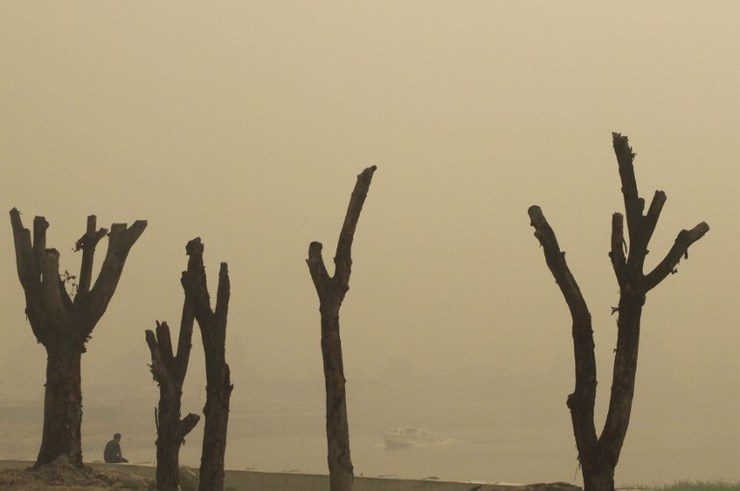SUMMARY
This is AI generated summarization, which may have errors. For context, always refer to the full article.

JAKARTA, Indonesia (UPDATED) – After 12 years, Indonesia’s legislature has finally voted to ratify the ASEAN treaty on cross-border haze – the last signatory to do so – as fires ripped through forests in the western side of the country, choking neighboring Singapore with hazardous smog.
Officials in Singapore and Malaysia have responded furiously to the annual problem of Indonesia’s forest fires, which have intensified and become more frequent in recent years.
In June 2013, haze from forest fires in Sumatra and Kalimantan caused the region’s worst pollution crisis in a decade, renewing calls for action in Indonesia.
Authorities have said most of the fires are deliberately lit to clear land for commercial plantations, such as paper and palm oil, and have arrested people caught in the act. But the problem continues to crop up every year.
What does the treaty mean?
The ASEAN Agreement on Transboundary Haze Pollution obliges signatories to strengthen its policies on forest fires and haze, actively participate in regional decision-making on the issue, and dedicate more resources to the problem, regionally and domestically.
All 10 ASEAN-member countries signed the agreement in June 2002 in Kuala Lumpur, but Indonesia will be the last one to ratify it. It only began deliberations on the bill on the ratification of the treaty in January.
“Indonesia has already carried out operations for the prevention, mitigation of forest fires and haze, and recovery activities, at the national level,” the legislature said in a statement.
“But, to handle cross-border pollution, Indonesia and other ASEAN nations recognize that prevention and mitigation need to be done together,” it said.
Lawmaker Milton Pakpahan said Indonesia was part of the international community and must therefore ensure that any exploitation of its natural resources does not cause environmental pollution.
He added that ASEAN countries need to cooperate to address the problem and share technology for handling fires.
“Indonesia will benefit through the mitigation of land and forest fires, technology transfer, and a mutual commitment between countries to reduce haze pollution,” he said.
“We also expect this cooperation to help enhance the credibility of Indonesia in the eyes of the world.”
Will it actually help?

At the very least, the ratification of the treaty could mean Indonesia now recognizes it needs help addressing the problem, and would be open to help from neighboring countries.
In 2011, for instance, Singapore offered to help put out forest fires, but Indonesia declined.
“We don’t need any help [from foreign countries] because we already have our own standard procedures for handling disasters. The forest fires are now being handled by the BNPB [National Disaster Mitigation Agency] through rain-making operations,” the deputy minister for environmental damage control and climate change, Arif Yuwono, said at the time, according to the Jakarta Globe.
In 2013 – amid one of the worst cazes of transboundary haze that threatened to turn into a diplomatic row – Agung Laksono, the coordinating minister for social welfare, was quoted as saying Indonesia would reject any offer of financial aid from Singapore unless it was a large amount.
“Unless (Singapore) wants to give us a large amount, we won’t consider accepting it,” he said. “If it is only half a million, or one million dollars, we don’t need that. We would rather use our own national budget.”
Complicated problem
Though a positive development, the ratification of the treaty and other recent measures would unlikely mean an immediate improvement to the haze problem.
For instance, Singapore in August passed a bill that gives the government powers to fine companies that cause or contribute to haze up to Sg$2 million ($1.6 million), regardless of whether they have an office in Singapore.
But David Gaveau from the Center for International Forestry Research wrote in July that policy interventions such as these first require solid information on who is setting fires to whose land.
“However, this basic information is missing, because competing claims over land ownership in Indonesia gives rise to confusion over who is setting fires to whose land,” he wrote.
“One cannot assume — based only on fire hotspot locations overlaid on concession maps — that burning within concessions is caused by large companies,” he added.
Andrew Manners, a research analyst at the Indian Ocean Research Programme, also wrote in March that while the ratification does have benefits, “if Indonesia and other ASEAN members are serious about tackling the annual haze, then other measures, which go beyond the Transboundary Treaty, will be needed.”
“Critics argue that the pact is vague and, as with other international pollution agreements, lacking in enforcement or dispute-resolution mechanisms. Although the agreement has been in force for over a decade, the problem continues unabated,” he wrote. – with a report from Agence France-Presse/Rappler.com
(EDITOR’S NOTE: An earlier version of the story incorrectly stated that Indonesia has already ratified the treaty. Indonesia’s House of Representatives on Tuesday passed the bill to ratify the treaty, which means the bill is now already a law, but the actual ratification will be done by the Ministry of Environment. We regret the error.)
Add a comment
How does this make you feel?
There are no comments yet. Add your comment to start the conversation.